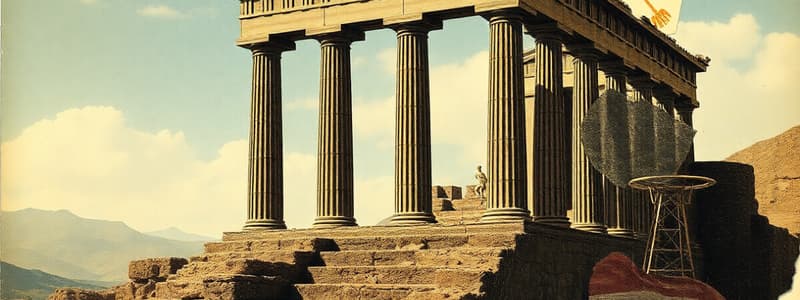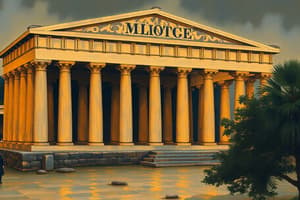Podcast
Questions and Answers
According to the content, how are divine laws different from man-made laws?
According to the content, how are divine laws different from man-made laws?
- Divine laws are unchanging and eternal, while man-made laws are subject to change. (correct)
- Divine laws are specific to individual cultures, while man-made laws are universal and apply to all people.
- Divine laws are enforced by human authorities, while man-made laws are enforced by divine beings.
- Divine laws are based on human reason, while man-made laws are based on divine revelation.
What does the content suggest about Creon's character?
What does the content suggest about Creon's character?
- Creon was deeply flawed but ultimately redeemed himself through his suffering.
- Creon was a devout believer in divine law and followed it strictly.
- Creon was a man who prioritized power and control over family and justice. (correct)
- Creon was a wise ruler who acted in the best interests of his people.
Which of the following is NOT a theme explored in the text?
Which of the following is NOT a theme explored in the text?
- The importance of honoring the dead
- The relationship between power and morality
- The conflict between individual conscience and social order (correct)
- The role of fate in human affairs
Based on the text, what was a defining aspect of the characters' lives?
Based on the text, what was a defining aspect of the characters' lives?
What can be inferred about the Greek cultural perspective on fate, based on the text?
What can be inferred about the Greek cultural perspective on fate, based on the text?
What was the defining characteristic of the Greek Dark Ages?
What was the defining characteristic of the Greek Dark Ages?
What is the significance of Linear B?
What is the significance of Linear B?
What was the primary reason for the decline of the Mycenaean civilization?
What was the primary reason for the decline of the Mycenaean civilization?
What role did city-states play in the Archaic Age of Greece?
What role did city-states play in the Archaic Age of Greece?
Which of these events is NOT considered a major battle of the Greco-Persian Wars?
Which of these events is NOT considered a major battle of the Greco-Persian Wars?
What is the significance of the Battle of Marathon?
What is the significance of the Battle of Marathon?
What was the main reason for the Spartan success at the Battle of Thermopylae?
What was the main reason for the Spartan success at the Battle of Thermopylae?
What strategy did Athenian naval forces employ at the Battle of Salamis?
What strategy did Athenian naval forces employ at the Battle of Salamis?
Why did the Persians lose at the Battle of Plataea?
Why did the Persians lose at the Battle of Plataea?
What was the significance of ostracism in Athenian democracy?
What was the significance of ostracism in Athenian democracy?
What was the basis for the election of Athenian Generals?
What was the basis for the election of Athenian Generals?
Which of these options is NOT a key part of Athenian culture and lifestyle?
Which of these options is NOT a key part of Athenian culture and lifestyle?
What role did women play in Athenian society?
What role did women play in Athenian society?
What is Creon's primary motivation in Antigone?
What is Creon's primary motivation in Antigone?
What is Antigone's main conflict in the play?
What is Antigone's main conflict in the play?
What is the significance of the contrast between Antigone and Ismene?
What is the significance of the contrast between Antigone and Ismene?
What is the primary theme of the play Antigone?
What is the primary theme of the play Antigone?
Flashcards
Divine Laws
Divine Laws
Laws set by God, eternal and unchanging, overruling human laws.
Penelope vs. Antigone
Penelope vs. Antigone
Penelope is quiet and reserved; Antigone is outspoken and bold in expressing loyalty.
Theme of Justice
Theme of Justice
Good deeds may not always be rewarded, while evil actions face consequences.
Fate vs. Free Will
Fate vs. Free Will
Signup and view all the flashcards
Importance of Loyalty
Importance of Loyalty
Signup and view all the flashcards
Minoans
Minoans
Signup and view all the flashcards
Mycenaeans
Mycenaeans
Signup and view all the flashcards
Linear B
Linear B
Signup and view all the flashcards
Greek Dark Ages
Greek Dark Ages
Signup and view all the flashcards
Polis
Polis
Signup and view all the flashcards
Phalanx Formation
Phalanx Formation
Signup and view all the flashcards
Battle of Marathon
Battle of Marathon
Signup and view all the flashcards
Battle of Thermopylae
Battle of Thermopylae
Signup and view all the flashcards
Ostracism
Ostracism
Signup and view all the flashcards
Creon
Creon
Signup and view all the flashcards
Antigone
Antigone
Signup and view all the flashcards
Haemon
Haemon
Signup and view all the flashcards
Civil Disobedience
Civil Disobedience
Signup and view all the flashcards
Epic of Gilgamesh
Epic of Gilgamesh
Signup and view all the flashcards
Study Notes
Minoans
- Flourished on Crete from approximately 2000-1000 BC
- Not Greek in origin, but influenced Greek culture
- Engaged in trade for economic gain
- Weakened by a volcanic eruption
- Conquered by the Mycenaeans
Mycenaeans
- Ruled from approximately 1600-1100 BC
- Conquered Crete and other city-states, unifying them
- Involved in the Trojan War
- Expanded their influence as far as Spain
- Created Linear B, an early form of Greek language
The Greek Dark Ages
- Period from approximately 1100-800 BC with limited information
- Characterized by sea raids
- Decline in wealth, population, trade, art, culture, and political stability
- Famine, drought, disease, rebellion, and natural disasters affected the population
- Loss of farming and literacy skills
- Urban exodus due to difficult conditions
- City destruction and abandonment
- Trade disruption and death
Archaic Age
- Period from approximately 800-500 BC
- Lack of a central powerful state; independent city-states emerged
- Greek colonization of the Mediterranean expanded
- Traded olive oil and pottery
- Greece's dominance in the region solidified
- Polis: the fundamental political unit, encompassing a city-state, surrounding countryside, and community for politics.
- Polis had variation in dialects and values.
- Forms of government included monarchy, oligarchy, tyranny, and (limited) democracy (excluding women)
- Hoplites: Greek infantry soldiers
- Phalanx formation: a powerful military formation of closely-packed soldiers using spears for combat
- Inter-city state conflicts were common; victory brought pride and prestige
Greco-Persian Wars
- Marathon (490 BC):
- Persian King Darius I aimed to conquer Greek territory
- Greek victory despite significant numerical disadvantage (Greeks outnumbered 3:1) due to phalanx formation
- Athenian messenger ran 26 miles to Athens to announce victory, collapsing and dying from exertion
- Persian retreat
- Thermopylae (480 BC):
- First of the second Persian invasions
- Persians sought to advance to Athens via the Thermopylae pass
- 7,000 Greeks held off 130,000 Persians for 7 days at the narrow pass
- Spartan defenders held off Persian advance for 2 days by blocking the only road
- Greek traitor revealed a back route, enabling Persian encirclement and defeat of the Spartans
- Salamis (480 BC):
- Naval battle
- Athenian general tricked Xerxes into thinking the Athenians were retreating
- Advantageous Athenian location (bay) allowed them to corner Persian ships, leading to many Persian casualties and retreat
- Plataea (479 BC):
- 3-day battle
- Greeks outnumbered, but Spartan leadership and strategic actions led to Persian losses
Athens
- Powerful military and government
- Aggressive expansionist approach (Imperialism), at times harsh
- Democracy limited to free male citizens
- Ostracism: procedure to temporarily exile unpopular citizens
- Yearly elected magistrates, including generals (selected for popularity and financial power), drawn from various social classes.
- Minimal agricultural self-sufficiency; relied on imports for food
- Focused on olive oil and wine production
- Known for philosophy (Socrates, Plato, Aristotle), the Olympics, and theatre
- Simple everyday life; extravagant public buildings
- Large-scale, publicly-accessible theatres
- Philosophy debated at social gatherings (dining)
- Men: Outdoors, socializing, and physical activity
- Women: Home-bound, childcare, cooking, and cleaning; marriage in early teens; possibly received education but limited roles
Antigone
- Creon:
- Made unjust decisions concerning burials
- Disregarded moral and divine law
- Antigone:
- Adhered to divine law, demanding a proper burial for her brother
- Rebelling against Creon's unjust decrees
- Ismene:
- Provided more reserved counsel: sister of Antigone
- Haemon:
- Creon's son, and Antigone's fiancé
- Rational approach and defiance of his father's decisions
- Creon as Tragic Hero:
- Initially acted for the good of his people, but with flawed understanding of moral order
- Disregarded divine laws; his decisions led to tragic consequences (family deaths)
- Proper Kingship:
- Piety, justice, and wisdom needed for proper leadership; putting people's interests ahead of one's own desires
- Contrast between man-made and divine law
- Divine laws prevail over human laws
- Focus on loyalty, justice, wisdom, piety, and the consequences of decisions
Comparison of Odyssey and Epic of Gilgamesh
- Themes of loyalty, loss, and divine intervention present in both
- Both heroes face challenges from antagonists; both experience tragic loss
- Civil disobedience: Antigone's actions in defying the state
Additional Themes
- Fate and free will: Creon's limited free will due to tragic destiny
- Importance of piety and loyalty: family loyalty and adherence to divine law
- Wisdom and moral judgment in decision-making
Studying That Suits You
Use AI to generate personalized quizzes and flashcards to suit your learning preferences.




